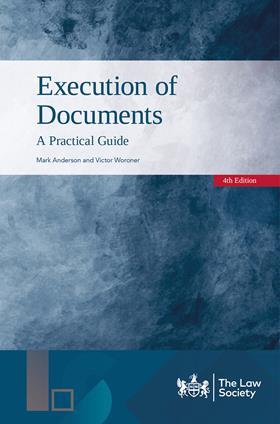Execution of Documents: A Practical Guide (4th edition)
Mark Anderson and Victor Woroner
£110, Law Society
★★★★★
This is an expertly written and practical guide to the execution of legal documents that are used in both contentious and non-contentious work. The core strength of the work is the depth of analysis with regard to ensuring that documents are executed correctly to be valid and understanding different execution methods. When, as I do, you execute documents on a daily basis but across a range of legal entities, this is a helpful and clear reminder of what to do when something out of the ordinary arises.

This edition sees the introduction of a dedicated chapter on the law concerning electronic signatures which, in keeping with the rest of the book, is clear, practical and easy to follow. Whether clients or another party are acting under a partnership, LLP, company, or charity, the book goes into some depth on the issues to consider. It continues in the same vein when considering other entities, such as universities and trusts.
This text should be available in every law firm in England and Wales; the execution of documents is critical to the services that we provide. While reviewing this book, I came across a number of incidences where the other side of a transaction or a piece of litigation has simply misunderstood the execution requirements arising from the facts. Those matters have been part and parcel of my day-to-day practice and I have known the answers, except in a single case where I found the answer in this book within a minute.
I could have researched the answer in our online library but it would have taken much longer to do so.
Paul Bennett is a partner with Bennett Briegal LLP and acts for law firms in relation to partnership and legal regulation matters































No comments yet